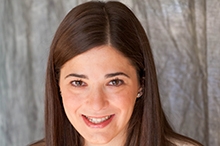Emily's Entourage: Giving Hope to Orphans of Orphan Disease

As a 30 year old with big eyes, a bright trajectory, and a fatal and progressing rare disease, precision medicine is not just a bold political initiative or exciting new era of biomedical research and personalized therapeutics – it’s my hope for a future.
My disease is cystic fibrosis (CF) and the good news is that in the past few years, there have been major breakthroughs for specific CF mutations. In 2012, the FDA approved the game-changing drug Ivacaftor for the treatment of a particular CF mutation affecting 4 percent of the CF population. As the first drug to treat the root cause of the disease rather than the symptoms, it was a landmark moment for the CF community and precision medicine at large, revealing its promise to transform unstoppable, life-shortening diseases.
Unfortunately, I belong to the “unlucky” minority that doesn’t benefit from this advance nor the latest combination therapy for the most common CF mutation, which is currently with the FDA for approval. My two copies of a rare nonsense mutation place me in territory so uncharted that there are no published statistics to indicate the size of my micro-community. I am a rarity among the rare, an orphan of an orphan disease, and an orphan with advanced and rapidly progressing disease. With only 35% of the average lung function at my healthiest, I do not have time to wait for research to unfold on its normal timeline.
But rather than become demoralized, my family, friends and I decided to take action. Precision medicine paradoxically spurred our realization of the essentialness of community—collective, imprecise and mighty in its power.
Those forces fueled the formation of Emily’s Entourage (EE), a 501(c)3 patient-and-community-powered research network that aims to fast-track research, drug discovery, and a cure for rare nonsense CF mutations.
Our belief in the power of community is at the heart of everything we do. Our community is local and virtual, and it includes academia, biotech, pharma, venture capital and other CF orphans from around the world. We see our most important role as connectors, facilitating the gateway between people, resources, science, and drug development. We want to remove barriers, catalyze collaborations, spur progress—and do it fast.
So far, we’ve made great strides. Since its inception on my parents’ living room floor in December 2011, EE has raised over $1.5 million through community events, social media campaigns, college campuses, and an annual gala and appeal.
Those funds support research grants to top-notch academic institutions and propel our efforts to forge unprecedented collaboration between leading scientists and industry, and facilitate the exchange of ideas across fields and institutions. In fact, earlier this year, we hosted a first-of-its-kind scientific symposium focused on rare nonsense CF mutations in partnership with the Penn Orphan Disease Center. I have personally donated millions of nasal epithelial and iPs cells for this research.
My experience with EE has taught me that communities are unstoppable. I believe that the only way to achieve expeditious progress for rare, orphan diseases is by opening gates, potentiating the exchange of information and resources, and building synergistic, collaborative and strong communities. After all, every orphan deserves a deep breath, loving care, and a foster (and eventual forever) home.
Emily Kramer-Golinkoff, MBE, is Co-Founder of Emily’s Entourage and Manager of Strategic Initiatives and Operations at the Penn Medicine Social Media and Health Innovation Lab.
White House Blogs
- The White House Blog
- Middle Class Task Force
- Council of Economic Advisers
- Council on Environmental Quality
- Council on Women and Girls
- Office of Intergovernmental Affairs
- Office of Management and Budget
- Office of Public Engagement
- Office of Science & Tech Policy
- Office of Urban Affairs
- Open Government
- Faith and Neighborhood Partnerships
- Social Innovation and Civic Participation
- US Trade Representative
- Office National Drug Control Policy
categories
- AIDS Policy
- Alaska
- Blueprint for an America Built to Last
- Budget
- Civil Rights
- Defense
- Disabilities
- Economy
- Education
- Energy and Environment
- Equal Pay
- Ethics
- Faith Based
- Fiscal Responsibility
- Foreign Policy
- Grab Bag
- Health Care
- Homeland Security
- Immigration
- Innovation Fellows
- Inside the White House
- Middle Class Security
- Open Government
- Poverty
- Rural
- Seniors and Social Security
- Service
- Social Innovation
- State of the Union
- Taxes
- Technology
- Urban Policy
- Veterans
- Violence Prevention
- White House Internships
- Women
- Working Families
- Additional Issues

